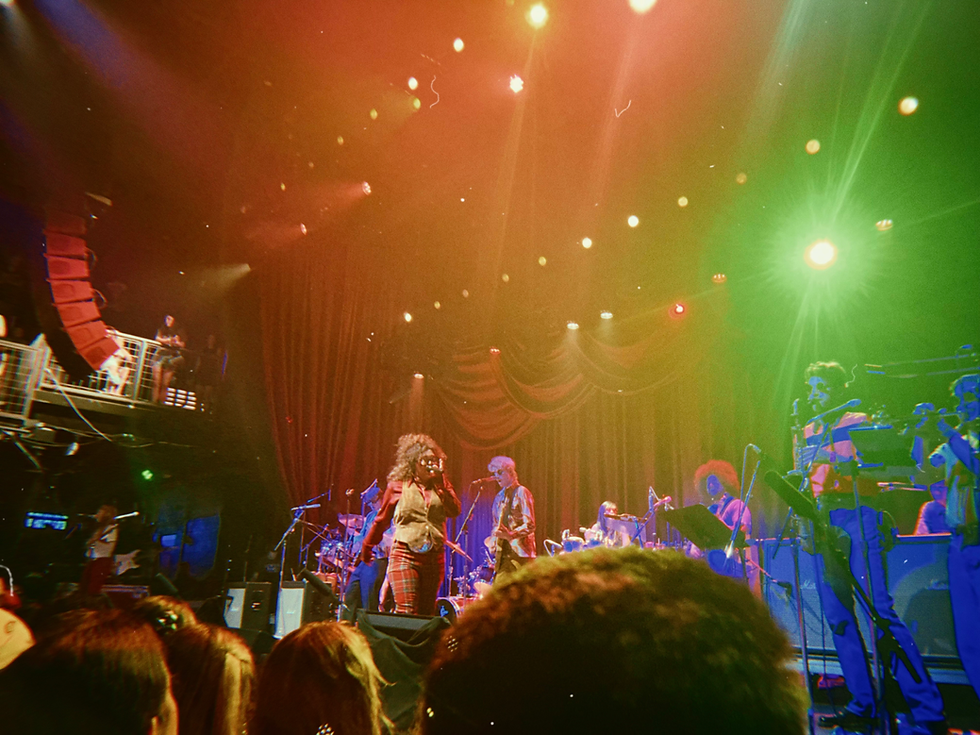"Call Me If You Get Lost" Gives Tyler the Creator One Of The Best Trilogies In The Past Decade
- Andrew Doucette
- Jul 6, 2021
- 6 min read

Tyler has become one of the most influential artists of this generation, and this is all from before he could legally drink. At 16, Tyler founded Odd Future, a hip hop collective of young artists that didn’t care about anything besides making havoc and staying creatively free. His early material of Bastard, Goblin, and Wolf became cult classics with emotive songs like “Yonkers”, “She”, and “IFHY”, each of which showed his talent in cinematography as well. This early material helped him gain his audience of other angsty teens that are just now becoming popular. Brockhampton as a whole, but Kevin Abstract especially have said they owe everything to Tyler. Teenage icon Billie Eilish has also said that Tyler, “inspired every part of everything about me.” But with as fantastic as many tracks from those projects are, he had yet to make a fully great album.
People would probably argue that some of those are great projects, but each of them have significant flaws that come with making music that young. At the end of this so-called era of Tyler, he was still only 22 years old. His next album, Cherry Bomb, acted as a bridge from that era, to the Tyler we know now. There are moments of the extremely soulful, lush production that’s now associated with Tyler, but there are also the messy, aggressive, youthful bangers he started out making. It straddles the youthful genius that created a cult-like fanbase, with the meticulous mastermind he is now. But everything anyone thought about him changed with 2017’s Flower Boy.
Flower Boy was a giant shift in sound for Tyler. Everything here was drenched with waves of soul and accessible melodies. Tyler himself was only rapping for a quarter of the runtime here, while the rest is pure chords and sonic beauty. It’s also the first time where Tyler started explicitly saying that he produced everything on the project. No matter if it’s the ominous string section on the opening of “Who Dat Boy” or the two minute intro of luscious instrumental that is “Garden Shed,” Tyler is the one behind the boards. The same rings true for 2019’s Igor, a heavy concept album that shows Tyler going through a difficult breakup. The lofi, synth heavy project was a departure again for Tyler, as he did a lot of singing on this project. “Gone Gone / Thank You” especially shows Tyler’s voice at its most authentic, and the lead single “Earfquake” was a pop hit originally made for Justin Bieber and Rihanna, but neither one of them wanted it. Igor was his second masterpiece in a row in a different sound, so the expectations for his next project were insanely high, and it finally arrived a couple weeks ago.

Call Me If You Get Lost was previewed with one official single, “Lumberjack,” and it gave us a hint that Tyler would be changing his sound once again. Instead of any soul, the track was a traditional hip hop banger with DJ Drama doing ad-libs to hype up the track. It was immediately shocking, especially to hear him rapping this hard for an album track. It wasn’t ultra surprising that Tyler would change his sound again, but a pure rap album was a bit unexpected. There was also another snippet a couple days before the project called “WusYaName” that seemed to be a tongue-in-cheek love track of Tyler convincing someone to be his significant other over the harmony God himself, Ty Dolla $ign. Each of these tracks were substantial enough, but nothing mind blowing after the two masterpieces that preceded this. Luckily, Call Me If You Get Lost lives up to those two opuses and makes this three project run one of the best runs in the past decade!
Once again, the sound for this project has changed once again from his previous release. Instead of the soulful, hip hop adjacent sound, this is a full out hip hop release. It sounds like a mature version of his early 2010s work, mixed in with some of Tyler’s extremely unique production style. There are attempts at pretty much every type of hip hop on here, including everything from trap to 90s R&B. Although it’s not as heavy as his previous two albums, there is an overarching concept to this album, aside from Tyler flexing and revelling in his own accomplishments. In this one, Tyler is a homewrecker and trying to force himself to be with a girl who’s already in a relationship.
This concept isn’t on every single track like it was on Igor, but you can see the love story evolve over the album. The aforementioned “WusYaName” is clearly Tyler trying to get the girl’s attention and it seems to be going well until the album’s 10-minute masterpiece, “Sweet / I Thought You Wanted to Dance”. This song continues Tyler’s tradition of the tenth song on the album being a two parter, and this one is the only song on the album that revolves heavily around singing. Tyler, Brent Faiyaz, and Fana Hues sing their hearts out over a flowery synth melody on the first half, and a heavy reggae sample from the 70s on the second half. “Sweet” is about just what the title implies, over-the-top infatuation with the love interest after getting to know each other. “I Thought You Wanted to Dance” shows Fana playing the role of Tyler’s love interest, who it turns out wasn’t interested in him in the same way. Tyler finally gives a devastating rap verse eight minutes into the song in response to Fana’s verse. But for all this context in the song, there’s just something about this track that’s incredibly beautiful and heartbreaking for the entire runtime. It doesn’t even matter what the concept is, this track is simultaneously groovy and heart wrenching. There’s always one on each Tyler project that’s beyond words and my understanding of music, and this one is that.
The concept makes its way into other tracks as well. “Wilshire” is eight minutes long and is basically a storytelling track of every detail Tyler could think of in that relationship. The second half of “Corso” sets up the story at the beginning of the album as well. Even the outro of a track like “Rise!” shows Tyler repeating, “Please don’t go, please just stay.” It’s enough of the album where some of the hardcore fans are trying to connect dots that may or may not be there from every track on the album. But even without the underlying concept, this album is sonically rich enough on almost every track that makes it a fascinating listen either way.
Whether the song is the most aggressive banger of 2021 or a slower jam made for Tyler to bar out over, every instrumental here is full of layers. “Lemonhead” with 42 Dugg is Tyler’s version of a trap banger, but there are still breaks in the beat and extra sounds that constantly change as the song progresses that keep the track interesting the entire time. That track also has a voicemail from Frank Ocean on the outro, which was a nice surprise after not hearing anything from Frank since his brother passing last year. “Juggernaut” with Lil Uzi Vert and Pharrell has a similar aggression, but the beat progression on here is maybe the best of 2021 so far. It’s so futuristic, but clearly of this age, while being so maximalist. Both of these songs would be nothing short of incredible live!
Even outside of all Tyler’s amazing production, there are tracks on here that show him rapping some of his best verses ever. “Hot Wind Blows” with Lil Wayne has a prominent jazz sample that provides the only instrumental backdrop, and both of them just bar out about their luxuries in life. Wayne especially gives one of his best feature performances in years and reminds people why he’s held in such high regard. “Massa” shows Tyler reflecting on his musical evolution and on the relationship between artist and fan. Obviously, the title references slavery and Tyler uses the exaggerated metaphor for how some artists feel controlled by their fans. “Manifesto” with Domo Genesis is Tyler’s response to people discovering all the controversial and offensive things he said in his past. I know I’m talking about bars right now, but the production on that track is another insanely detailed, ever-changing collection of sounds that have no reason to work that well together.
I think part of what else makes Tyler special is how he talks about love. In each of these past three albums, love has been at the center of the concept, whether it’s just a crush or in the middle of a love triangle. At the end of each album, he always ends up by himself. Sometimes it’s an explicit no by the person of interest, like at the end of this one, or sometimes his phone confession of love doesn’t send, like on “Glitter”. No matter the journey, the result is always the same. He just makes the journey sound so enthralling and all encompassing that it even connects with someone like me. It’s almost like he’s saying that it’s not the destination that matters, but the journey, which would also fall in line with the travel theme he’s brought onto this project as well. Call Me If You Get Lost is another endeavour into Tyler’s experience of grappling with love, but it’s also the culmination of his musical expertise into another easily enjoyable masterpiece.



Comments